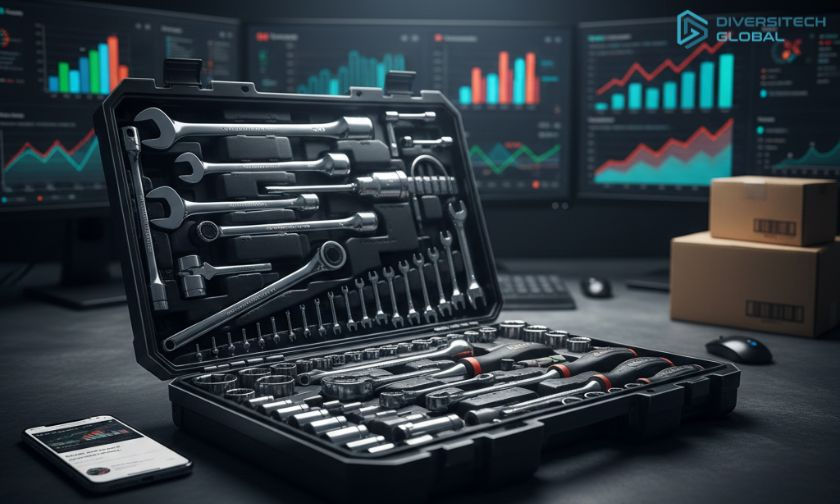Emerging Trends in Toolbox Manufacturing Technology in China
- Diversitech Global

- May 7, 2024
- 5 min read
Updated: May 14, 2024

In the industry of tool storage solutions, toolbox manufacturers in China stands at the forefront of mass production and efficiency. The country's manufacturing sector has long been recognized for its ability to not just keep pace with global trends but often to set them, particularly in industries requiring a blend of technical precision and mass production capabilities such as toolbox manufacturing. Chinese manufacturers have adeptly navigated the challenges and opportunities presented by the global market, leveraging cutting-edge technologies and processes to enhance product quality, reduce costs, and meet the increasingly specific demands of consumers worldwide.
Table of Contents:
Automation and Robotics in Production
Enhanced Precision and Efficiency
The adoption of automation and robotics in the toolbox manufacturing process has significantly improved the precision and efficiency of production lines. Automated machinery and robotic arms can perform tasks such as cutting, welding, and assembly with a level of accuracy that far exceeds human capabilities, resulting in products with superior build quality and consistency.
Cost Reduction and Scalability
By automating repetitive and labor-intensive tasks, manufacturers are able to reduce labor costs and minimize human error. This scalability allows for increased production volumes without a corresponding increase in production costs, making Chinese manufacturers more competitive in the global market.
Future of Workforce Development
The shift towards automation necessitates a change in the workforce skill set. There is a growing need for technical personnel who can manage, maintain, and optimize these automated systems, indicating a trend towards more skilled labor in the manufacturing sector.
IoT Integration in Toolbox Design
Enhanced Functionality and User Experience
Integrating IoT technology into toolboxes enables functionalities such as tool tracking, inventory management, and condition monitoring. These smart toolboxes cater to the increasing demand for products that enhance user convenience and efficiency.
Data Analytics for Product Improvement
Manufacturers can collect and analyze data on how their toolboxes are being used, allowing them to identify areas for improvement and innovation. This data-driven approach to product development enables manufacturers to create toolboxes that better meet the needs of end-users.
Security Features
IoT technology also allows for the incorporation of advanced security features in toolboxes, such as remote locking mechanisms and access control via smartphones, providing peace of mind to users concerned about tool security.
Green Manufacturing Processes
Sustainable Material Use
An emerging trend among toolbox manufacturers in China is the shift towards using more sustainable and recyclable materials. This not only reduces the environmental impact of their products but also appeals to the growing segment of eco-conscious consumers.
Energy-efficient Production
Manufacturers are investing in energy-efficient machinery and adopting processes that minimize waste and energy consumption. These practices not only contribute to environmental sustainability but also result in cost savings for manufacturers.
Compliance with Environmental Regulations
By adopting green manufacturing processes, Chinese manufacturers ensure compliance with increasingly stringent domestic and international environmental regulations, helping to avoid potential trade barriers and maintaining access to global markets.
Customization and Personalization
Meeting Diverse Consumer Needs
In response to the demand for personalized products, toolbox manufacturers are offering options for customization. This includes customizable inserts, modular designs that can be adapted to various needs, and a range of colors and finishes.
Digital Fabrication Technologies
Technologies such as 3D printing are being utilized to create custom parts and accessories for tool boxes. This allows for rapid prototyping and the cost-effective production of small batches of customized products.
Online Platforms for Custom Orders
Manufacturers are leveraging online platforms to offer consumers the ability to customize their tool box orders directly. This direct-to-consumer approach reduces lead times and allows for more personalized customer service.
Want to incorporate sustainability into your craft & art tool kits & double your sales? Get in touch
Advances in Toolbox Material Technology
High-strength, Lightweight Materials
The development and use of high-strength, lightweight materials such as advanced polymers and aluminum alloys enable the production of tool boxes that are both durable and easy to transport.
Corrosion-resistant Coatings
Advancements in coating technologies have led to the development of corrosion-resistant finishes that extend the lifespan of tool boxes, even in harsh working environments.
Eco-friendly Materials
There is an increasing use of eco-friendly materials in tool box manufacturing, reflecting a commitment to sustainability and reducing the carbon footprint of production.
Supply Chain Optimization
Just-in-time Manufacturing
Tool box manufacturers are adopting just-in-time manufacturing principles to reduce inventory costs and increase operational efficiency. This approach requires precise coordination with suppliers and efficient production planning.
Global Supply Chain Integration
Chinese manufacturers are integrating their supply chains with global logistics networks, enabling them to quickly and efficiently ship products to markets around the world.
Resilience and Risk Management
The COVID-19 pandemic highlighted the importance of supply chain resilience. Manufacturers are diversifying their supplier base and developing contingency plans to manage supply chain risks more effectively.
E-commerce and Digital Marketing
Expanding Online Sales Channels
The rise of e-commerce platforms has provided tool box manufacturers with new avenues for reaching consumers directly. Many are expanding their online presence to tap into global markets.
Digital Marketing Strategies
Manufacturers are adopting sophisticated digital marketing strategies, including search engine optimization (SEO), social media marketing, and targeted advertising, to increase brand visibility and drive online sales.
Customer Engagement and Feedback
Digital platforms also offer manufacturers valuable opportunities for engaging with customers and gathering feedback, which can inform product development and improve customer satisfaction.
Regulatory Compliance and International Standards
Adhering to Global Safety Standards
Compliance with international safety standards is essential for manufacturers looking to export their products. This includes certifications such as ISO and CE marking, which reassure buyers of the quality and safety of their toolboxes.
Navigating Trade Tariffs and Barriers
Understanding and navigating trade tariffs and non-tariff barriers is crucial for manufacturers aiming to compete in the global market. Many are investing in legal and trade expertise to manage these challenges effectively.
Intellectual Property Protection
Protecting intellectual property rights is of paramount importance, especially as Chinese manufacturers innovate and develop proprietary technologies. Efforts to secure patents and trademarks are key to maintaining a competitive edge.
Related Article: The Impact of Trade Policies on China's Toolbox Export Industry
Workforce Development and Skills Training
Upskilling for Advanced Manufacturing
The shift towards advanced manufacturing technologies requires a workforce with specialized skills. Manufacturers are investing in training programs to upskill their employees in areas such as robotics, data analysis, and digital fabrication.
Collaboration with Educational Institutions
Partnerships with universities and technical colleges are becoming increasingly common, with manufacturers sponsoring research projects and offering internships to cultivate the next generation of skilled workers.
Attracting Talent in a Competitive Market
Attracting and retaining talent is a significant challenge for manufacturers. Many are enhancing their employer branding and offering competitive salaries and benefits to draw skilled professionals to the industry.
Strategic Insights for the Road Ahead
The landscape of toolbox manufacturing in China is being transformed by a confluence of advanced technologies, environmental considerations, and changing consumer preferences. As manufacturers continue to innovate and adapt to these trends, they are not only enhancing their competitiveness but also contributing to the broader evolution of the manufacturing sector. The agility and foresight demonstrated by these companies are key to navigating the challenges and seizing the opportunities that lie ahead in the global market.
Related Article: How Chinese Toolbox Makers are Tapping into New Markets
Want to incorporate sustainability into your craft & art tool kits & double your sales? Get in touch




The Slope Game pulsating electronic soundtrack matches the high-speed action, amplifying adrenaline and drawing players deeper into the mesmerizing flow of the game.
Absolutely, this is an exciting time for toolbox manufacturing in China. It’s impressive to see how technology and sustainability are reshaping the industry. Consumers are definitely more conscious now, and it’s great that manufacturers are stepping up to meet those demands. Innovation really is the name of the game—staying ahead means not just surviving but thriving in a competitive global market. I’m curious to see what new designs and eco-friendly solutions come next! hill climb racing